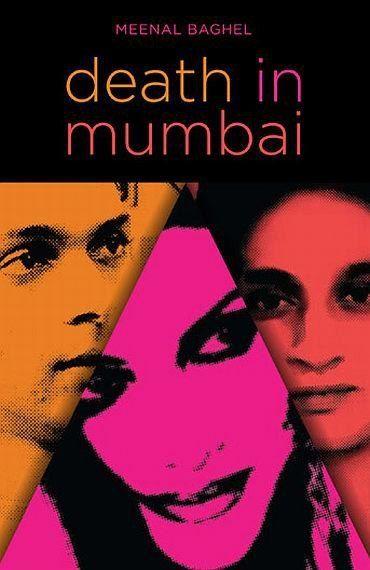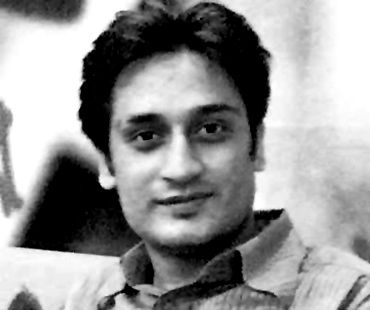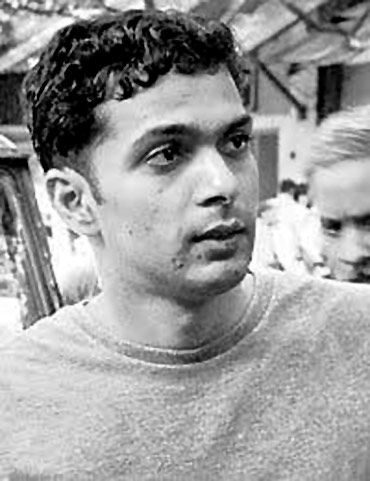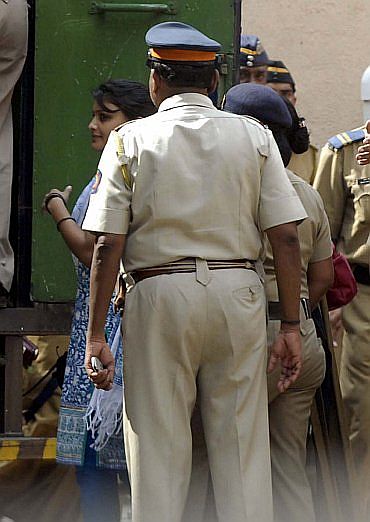 | « Back to article | Print this article |
'Grover murder is also a story of young India'
Sheela Bhatt speaks to Meenal Baghel, author of Death In Mumbai, an account of the Grover murder case, on the judgment that has shocked and surprised many.
The complicated story of love, sex and betrayal of television executive Neeraj Grover, Kannada actress Maria Susairaj and Naval Lieutenant Emile Jerome Mathew is, also, about unbearable tragedy of three families, says Meenal Baghel, author of Death In Mumbai, an account of the Grover murder case.
In May 2008, the murder of Neeraj Grover shook Mumbai. As the details of the murder came out it shocked many small-town parents whose children live in metropolises.
On a surprise visit Emile, Maria's boyfriend, found Neeraj Grover in Maria's bedroom in Mumbai and he stabbed and killed him with a kitchen knife. The way Maria and Emile Jerome disposed of the body was what shocked many people.
Maria managed to go to a mall to buy airbags and room freshener and a big knife. They then cut Grover's body into more than 200 pieces and packed it in the bags, took it to the outskirts of Mumbai and burnt it.
Also Read: Maria Susairaj likely to walk free on Friday
Then Maria went to police station to file a complaint that Grover, her 'boyfriend,' was missing. She even painted her house to remove bloodstains and destroy evidence. However, Maria and Emile were arrested after a swift police investigation.
Baghel, who is also editor-in chief of the tabloid Mumbai Mirror, told rediff.com, "It's really the tragedy of three families. When you see Emile's father in court, you know he never had any exposure to the police, courts or media. You see an absolutely dead expression on his face. It's heart-breaking to talk to Neeraj's parents. They have lost everything. It's really, really, sad."
Please click NEXT to read more..
'The judgment has shocked the Grover family'
She said her book, to be published in August, will carry extensive insight into the families of Grover, Susairaj and Mathew. She has interviewed Maria and Emile at length for the book.
It was one of the most gripping cases that raised issues like fidelity and infidelity in relationships of urban India. Judge M L Chandwani of the Mumbai's session court who gave the judgment on Thursday has shocked the Grover family, prosecutors and everybody who has been following the case.
Nobody expected this light conviction because Maria had conceded in her confessional statement that murder happened before her eyes, and she was party to destroying evidence.
The judge in his wisdom has said that Mathew is, "guilty of culpable homicide not amounting to murder." He was also declared guilty of destroying evidence. This carries a maximum sentence of ten years in prison.
Culpable homicide is a lesser crime than murder where a person has clear intent to kill and knows that the victim is 'most likely' to be killed. Maria was not found guilty of murder but of destroying evidence.
'Parents have little idea who their children are becoming'
While commenting on the judgment, Baghel says, "Although, both Emile and Maria have been convicted, I think the judge has kept a distance from the fact of ghastliness of the crime that act of chopping the body and the way they burnt it to deliver a very balanced judgment."
The judgment largely depends on Maria'a confessional statement. In the confession she completely blamed Emile. She has not attributed any role to herself.
Baghel says, "Of course, she has said bizarre things like that they had sex while Neeraj's body was lying there. These are all very shocking things. I think the judge has treated it like a regular murder case."
Maria was the girlfriend of Emile, who lived in Kochi, Kerala. However, no one is sure if Maria 'loved' Emile.
In fact, Ram Gopal Verma has made a film Not A Love Story on the Maria-Neeraj-Emile's relationship. Maria came to Mumbai to try her luck in the film industry.
She went for 'casual relationship' with Neeraj Grover. All three characters were good looking, smart and ambitious. And, then, it so happened that Emile arrived early morning to Maria's home in Mumbai's suburb in May, 2008 to find Maria in Neeraj's arms and went crazy.
While commenting on the complexity of the murder and passion behind it, Baghel says, "This has been very fascinating for me. My book is about youth. It's about the relationship between parents and children. How little, actually, parents know their children. In all three cases, the parents are from small towns. Then, their children come to big cities. And, parents think their children are doing well and they are wonderful people and well-adjusted to the new cities where they are working. Despite the fact that they speak to each other everyday they have little idea of who their children are becoming."
'There is a real divide between two genders about casual sex'
She adds, "Second, at the heart of this book is very real issue of sex and the changing dynamics between men and women. Without trying to sound judgmental I have said that the fact is that women are going in a different direction than the men are socially conditioned to accept. The men have not moved in same direction and as far as women. There is a real divide between two genders about casual sex. At the heart of the Maria story and my book is about the attitude of woman and man about casual sex."
While adding strength to her argument, Baghel said, "Today, when the judge was reading the judgment he said one can imagine how difficult it is for a fiance to find another man in his fiancee's home. This is reaction of all the men like lawyers and others whoever I have spoken to. They find it very difficult to accept the women's point of view."
Explaining her take on the motive behind the murder, Baghel says, "The motive was that Emile could not digest the fact that there was another man in his girlfriend's life."
When asked to explain why Maria indulged in such an act, Baghel says, "That seems incidental to her. As I said, there is the issue of casual sex and man and woman relationship, here. She really wanted to marry Emile. He wasn't committing to her. It's a fact. So, she came to Mumbai. She got acquainted to Neeraj and that led to his murder."
'It's not easy to understand Maria'
Baghel says that it is not easy to understand Maria. "It's difficult to understand her mind. First, I perceived her from the press reports. My understanding has changed a great deal over the many weeks that I met her in court."
While talking about the Grover family and their quest for justice for their son, Baghel says, "Nothing will bring back their son. They wanted Maria to be convicted but that has not happened. The whole point of trial was that you go by point of law rather than emotion. Justice is a very lonely and subjective emotion. It will never be done for parents."
When asked if she has started liking Maria while writing her story, Baghel says, "It's not a question of liking or not liking but she has certainly become more human to me and likewise Emile. I learnt patience while writing this book. You keep waiting and waiting for some lucky day when somebody trusts you enough to talk to you. I do think that the ghastliness of crime is not adequately considered in the case."
Baghel got involved in the case and started toying with the idea of writing the book on it when she saw a series of photographs of the parents of all three main characters.
She says, "I was deeply disturbed to see the grieving parents. These three protagonists came from middle-class families from small towns and they were achievers in their own way, too. After all, Emile was a naval officer, Neeraj was doing well in his career and Maria had done three films back home in Karnataka. What put them together in Mumbai, what prompted Maria and Emile to commit such cruelty? Its extraordinary cruelty they committed after the murder. It is very, very hard-hitting. Their background and their personalities, I found fascinating."
'Part of the reason behind this tragedy is youth'
Meenal emphasises that her story of Maria is also the story of Young India.
In this story one question that haunts everyone is why should Emile murder Neeraj? In a city like Mumbai so many such relationships and heart-breaks happen but lovers go on with life.
Meenal says, "I told you that it's also about youth. If they would have been in their late thirties or forties nobody would have behaved as they did. Emile would not have come to Mumbai in a tearing hurry. Maria would have understood things differently. When you grow older, you grow older emotionally, too. After some age there are other things in your life. Romance is just one of the things. Part of the reason behind this tragedy is youth."
She adds, "At age of 36 if some man found her girlfriend with somebody he would tell himself I will dump her tomorrow. Also, this casual sex and man and woman relationship angle is very much here. Emile was a small town boy and casual sex in the Mumbai mould was not acceptable to him."
Although, in the court her lawyer denied that Neeraj and Maria had any relationship but still a question arises, 'Did Maria love Neeraj or Emile?'
Baghel says, "She obviously had feelings for Emile."





